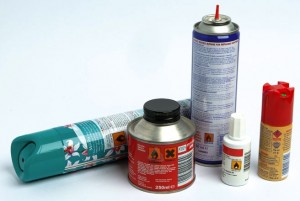 Classification: Gas anesthetic
Classification: Gas anesthetic
Common Names/Nicknames: Huff
Active Compound: Various solvents such as aliphatic hydrocarbons, aromatic hydrocarbons, haloalkanes, and ketones
Found in: Industrial solvents, glues, coolants, propellants
Mode of Consumption: Inhalation
DEA Scheduling/Legal Status (in US): Unscheduled, illegal to use for recreational drug purposes
Effects:
Relaxation, giddiness, hallucinations, anesthesia, slurred speech, wheezing
Risks:
Acute: Accidental injury, headache, dizziness, impaired judgment, freezeburn, vomiting, pneumonia, neuropathy, hypoxia, respiratory depression, permanent nerve damage, permanent lung damage, permanent brain damage, permanent kidney damage, permanent liver damage, permanent heart damage, permanent blood disorders, sudden death
Chronic: Permanent nerve damage, permanent lung damage, permanent brain damage, permanent kidney damage, permanent liver damage, permanent heart damage, permanent blood disorders
Dangerous Drug Combinations:
Potentially fatal combination with alcohol, barbiturates, methaqualone, benzodiazepines, and other sedative drugs.
Special Considerations:
Solvent inhalants are widely regarded as one of the most dangerous drugs that can be abused. Inhalant abuse has the highest per-use risk for life threatening emergency of any abused drug. Accidental poisoning can occur when using industrial solvents in poorly ventilated areas.
And remember, if somebody may need help, play it safe and call for medical assistance.
“Students may bring an intoxicated or drug-impaired friend to University Health Services or to a hospital, or seek assistance from College residential life staff or HUPD, and by doing this, neither they nor the friend will face disciplinary action from the College for having used or provided alcohol or drugs.”
The Amnesty Policy
Harvard College Student Handbook
Sources:
Buzzed: The Straight Facts About the Most Used and Abused Drugs from Alcohol to Ecstasy (Third Edition), by Cynthia Kuhn, Scott Swartzwelder, and Wilkie Wilson. Published 2008 by W. W. Norton & Company.
National Institute on Drug Abuse (NIDA), part of the National Institute of Health (NIH) of the U.S. Department of Health and Human Services.
http://www.nida.nih.gov/DrugPages/
U.S. Drug Enforcement Agency (DEA), part of the U.S. Department of Justice.
Erowid Organization

